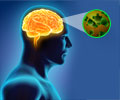
There are multiple intracellular sensors that detect viral infection by binding to viral nucleic acids (RNA and DNA). The majority of these receptors activate type I interferon (IFN) cytokines, which prevent viruses from copying themselves and facilitate appropriate antiviral immune responses. "The interferon response triggered by these sensors is important for protection against infection, but it must be carefully regulated to prevent inappropriate activation by the cells' own DNA and RNA," explains senior study author, Dr. Daniel B. Stetson from the Department of Immunology at the University of Washington School of Medicine.
In an earlier study, Dr. Stetson and colleagues identified an enzyme called Trex1 as an essential negative regulator of the antiviral response. Mutations that inactivate the gene for Trex1 have been linked with multiple IFN-associated human autoimmune diseases, including Aicardi-Goutieres syndrome (AGS). In the current study, the researchers used a Trex1-deficient mouse model of AGS to present a detailed step-wise characterization of the development of autoimmune disease. They identified the specific pathway linking DNA detection with IFN production and described how IFNs drive different aspects of the immune response.
"Together, our results provide an integrated picture of the development of autoimmune disease caused by Trex1 deficiency and a framework for understanding its progression," concludes Dr. Stetson. "Our findings have important implications for the development of therapies for IFN-associated human autoimmune diseases, such as systemic lupus erythematosus and AGS, a rare and severe disease that is currently untreatable and incurable."
Source-Eurekalert












